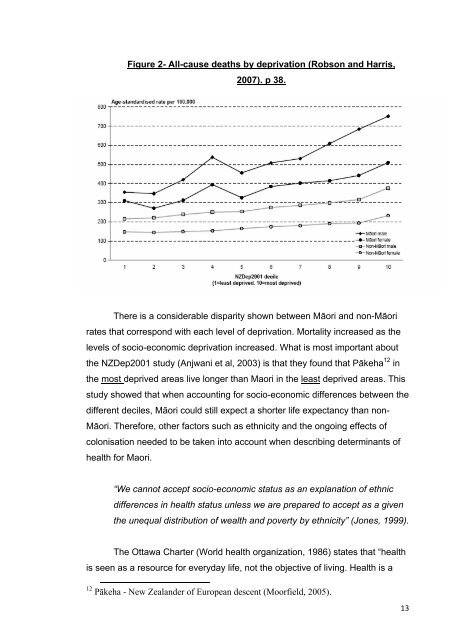Te Māoritanga WELLBEING AND IDENTITY Kapa Haka as a Vehicle
Te Māoritanga WELLBEING AND IDENTITY Kapa Haka as a Vehicle
Te Māoritanga WELLBEING AND IDENTITY Kapa Haka as a Vehicle
You also want an ePaper? Increase the reach of your titles
YUMPU automatically turns print PDFs into web optimized ePapers that Google loves.
Figure 2- All-cause deaths by deprivation (Robson and Harris,<br />
2007). p 38.<br />
There is a considerable disparity shown between Māori and non-Māori<br />
rates that correspond with each level of deprivation. Mortality incre<strong>as</strong>ed <strong>as</strong> the<br />
levels of socio-economic deprivation incre<strong>as</strong>ed. What is most important about<br />
the NZDep2001 study (Anjwani et al, 2003) is that they found that Pākeha 12 in<br />
the most deprived are<strong>as</strong> live longer than Maori in the le<strong>as</strong>t deprived are<strong>as</strong>. This<br />
study showed that when accounting for socio-economic differences between the<br />
different deciles, Māori could still expect a shorter life expectancy than non-<br />
Māori. Therefore, other factors such <strong>as</strong> ethnicity and the ongoing effects of<br />
colonisation needed to be taken into account when describing determinants of<br />
health for Maori.<br />
“We cannot accept socio-economic status <strong>as</strong> an explanation of ethnic<br />
differences in health status unless we are prepared to accept <strong>as</strong> a given<br />
the unequal distribution of wealth and poverty by ethnicity” (Jones, 1999).<br />
The Ottawa Charter (World health organization, 1986) states that “health<br />
is seen <strong>as</strong> a resource for everyday life, not the objective of living. Health is a<br />
12 Pākeha - New Zealander of European descent (Moorfield, 2005).<br />
13
















